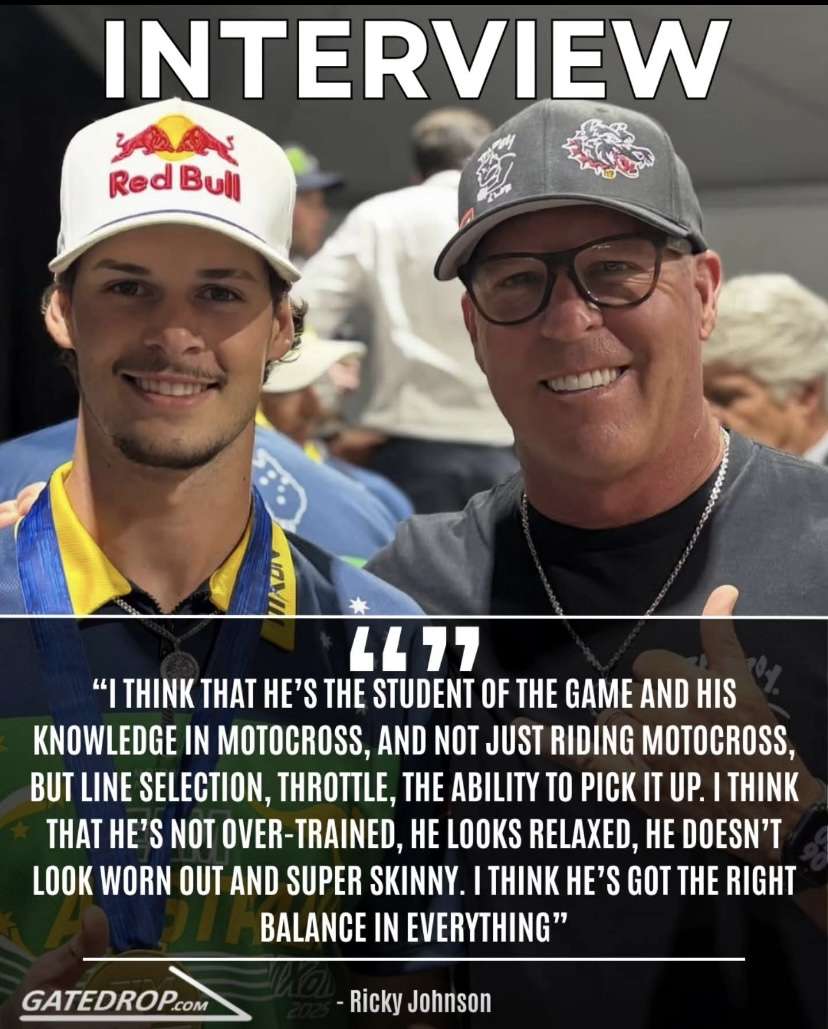
Ricky Johnson was once the rider everyone measured themselves against — the dominant force in motocross whose speed, will and fearless racecraft put him at the top of the sport. In a candid conversation, Johnson revisited those glory days, the injury that abruptly ended that peak, and offered a veteran’s, no-nonsense assessment of two of today’s biggest names: Jett Lawrence and Haiden Deegan.
Johnson’s rise in the early 1980s read like a legend in the making. His combination of raw speed, technical savvy and aggressive instincts made him the benchmark for peers and challengers alike. But as he remembers it now, the arc of greatness in motocross can be fragile — a season, a moto, or a crash can change everything. The career-halting injury that stole his momentum happened while he was still at the top, and its suddenness left an indelible mark. “You don’t plan for that,” Johnson says quietly. “One minute you’re the guy, the next you’re fighting to get back to where you were. It teaches you a lot about perspective.”
That perspective — tempered by pain, recovery and time away from the limelight — is exactly what gives Johnson’s opinions weight today. He speaks not as a nostalgia-ridden legend but as someone who knows what it takes to stay at the sharp end and the pitfalls that can derail a great career.
On Jett Lawrence, Johnson’s praise is unequivocal. “He’s the student of the game,” Johnson says. For him, Lawrence isn’t just fast; he’s technically astute. Johnson highlights Jett’s line selection, throttle control and the knack for picking up his bike when it matters. “He looks relaxed, he doesn’t look worn out, super skinny, and…not over-trained. He’s got the right balance in everything.” That balance, Johnson argues, is supported by a stable environment — family, trusted mechanics and a team that understands how to build a long, sustainable career. “He’s at the right place at the right time, and he is the man. I mean, I can’t say enough great things about him,” Johnson concludes.
But Johnson’s appraisal of Haiden Deegan is more layered. He admires Deegan’s work ethic and the family machine that has fostered his rise. “I admire Haiden, I admire the family…As well as that, Haiden works hard,” Johnson says, pointing out that talent alone won’t spare a rider from the physical toll of moto racing. Yet Johnson also cautions that a raceday persona can become a trap. He urges Deegan to understand the distinction between the athlete’s aggressive, competitive identity and the person off-the-bike. “Your race persona is not your real life persona,” he warns — advice born from Johnson’s own mistakes.
That admission is striking: Johnson acknowledges that in his early peak years he embraced intimidation as a tactic, pushing contact and conflict in ways he would later regret. “In 1983, I thought I needed to beat Bob Hannah and I needed to hit everybody… I was literally forcing contact,” he says. The realization that such aggression was a self-sabotaging strategy came with hard lessons about career longevity and reputation. “I realized…that’s not me. If you want to scrap, I’ll scrap. But I’d rather not.” That lesson — that keeping friends and respect in the paddock can extend your career — forms the backbone of his advice to young riders.
Johnson’s view of Deegan is therefore not dismissive; it’s cautionary and caring. He respects the hunger and says Deegan is doing “the right things on the bike and training wise,” but he wants to see maturity follow talent. The cost of being perceived as a hothead, Johnson explains, is that you make enemies — and in a sport where physicality and split-second decisions matter, being targeted can shorten a promising career.
Throughout the interview, Johnson balances hard-won humility with passion for the sport. His story about an injury that cut short his dominance serves less as a sour note and more as a reminder: greatness in motocross isn’t a given — it’s earned, protected, and sometimes painfully defended. That’s why he admires Jett’s measured approach and why he gently urges Deegan to temper bravado with wisdom.
Ricky Johnson’s verdict is simple and clear: talent opens the door, but longevity requires intelligence, restraint and the right team. For fans watching the current generation, his words are both a celebration of what they see in Jett Lawrence and a cautionary nudge to Haiden Deegan — grow fast, but don’t rush the parts of the game that keep champions on the gate for the long haul.
Leave a Reply